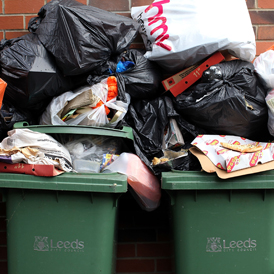Government ‘abandons’ plans for weekly rubbish collection
Communities Secretary Eric Pickles appears to have scrapped plans to force councils to reinstate weekly rubbish collections, the government waste review is expected to announce.
In a row over household waste Eric Pickles appears to have acknowledged that central government is not going to be able to force councils to abandon fortnightly bin collections.
Around 10 million households in the UK now have their general household rubbish picked up just once every two weeks.
Mr Pickles and Environment Secretary Caroline Spelman are understood to have abandoned the fight to reinstate weekly collections.
It is understood the move will be announced as part of the waste review being published next week.
The Government is also expected to reveal that councils will be stripped of the ability to impose fines on householders who break minor bin collection rules.
Under changes to the law town halls will only be able to issue fixed penalty notices to “neighbours from hell” who allow rubbish to pile up, or those who fly-tip.

A Government source said the changes aimed to stop fines being issued for breaking “confusing, arbitrary and unfair” rules, in the wake of reports of people being fined for putting rubbish into the wrong bin, failing to close their bin lid or putting a bag of waste out alongside their wheelie bin.
Under existing rules, councils can fine householders up to £110 for breaching regulations on putting out rubbish. A failure to pay the fines can leave households facing court fines of £1,000.
The changes to the rules are part of the waste review launched last year by the new coalition Government to examine how best to encourage householders, companies and communities to produce less waste and boost recycling – putting a focus on encouraging people with incentives rather than penalties and “coercion”.
The review has also been looking at future infrastructure needs, including producing energy from waste and from a biological process known as anaerobic digestion.
Announcing the review last year, Caroline Spelman said it was an opportunity to look at how to increase recycling, reduce landfill – which costs councils in landfill tax – and unlock the economic value of items which people no longer want.
The move came after increasing controversy over waste and recycling policies, which now sees more than half of councils using collections which only pick up domestic rubbish once a fortnight, and a failed attempt by the previous government to bring in a “pay as you throw” pilot to penalise people for creating too much rubbish.
-
Latest news
-
Windrush scandal: returning to the UK after a forty year wait6m

-
Netanyahu ‘survival’ depends on ‘expanding war’ says head of Palestinian National Initiative5m

-
Proposed law change could strip parental rights from paedophiles5m

-
Hugh Grant settles privacy lawsuit against The Sun newspaper publisher2m

-
Post Office Scandal: what did top executive know?6m

-




